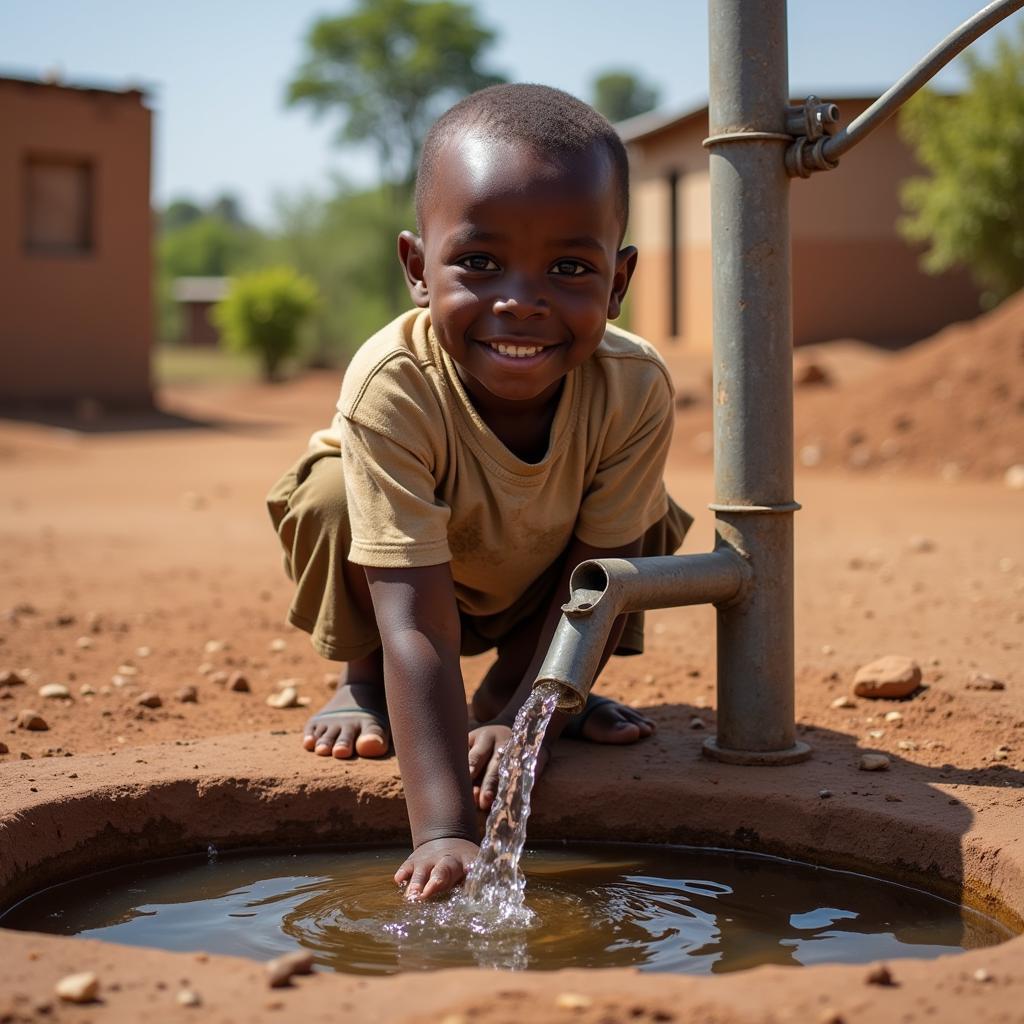African Children Study Suggesting Worse Outcomes with Excessive Fluids
A recent study focusing on children in sub-Saharan Africa has brought to light a concerning correlation between excessive fluid intake and negative health outcomes. This research, while still in its early stages, raises questions about the potential dangers of overhydration in vulnerable populations and has sparked a significant conversation in the global health community.
Unraveling the Findings: What Does the Research Say?
The study, conducted across multiple rural communities, tracked the health and developmental milestones of a large cohort of children under the age of five. Researchers observed a higher prevalence of diarrhea, stunted growth, and other health complications among children who consistently consumed fluids beyond their physiological needs.
 Child Drinking Water
Child Drinking Water
It’s crucial to understand that this study doesn’t advocate for restricting children’s access to water, especially in regions often plagued by water scarcity and sanitation challenges. Instead, it underscores the need for nuanced approaches to hydration, particularly for young children who are susceptible to the adverse effects of overhydration.
The Science Behind the Connection: Why Could Excessive Fluids Be Harmful?
While our bodies require a delicate balance of fluids to function optimally, exceeding this limit can disrupt this equilibrium and lead to various health issues. In young children, whose kidneys are still developing, the risks associated with overhydration are further amplified.
One of the key mechanisms through which excessive fluid intake can negatively impact health is by diluting essential electrolytes in the body. Electrolytes, such as sodium and potassium, play a crucial role in regulating numerous bodily functions, including nerve impulses, muscle contractions, and fluid balance. When these electrolytes become imbalanced due to overhydration, it can lead to a cascade of health problems, ranging from mild symptoms like fatigue and confusion to more serious complications like seizures and even coma.
The Importance of Context: Factors Influencing Fluid Needs in African Children
Understanding the unique context of sub-Saharan Africa is crucial to interpreting these findings. Factors like climate, socioeconomic conditions, and prevalent diseases significantly influence fluid requirements and can make children in these regions more vulnerable to the adverse effects of overhydration.
For instance, the hot and humid climate prevalent in many parts of sub-Saharan Africa increases the rate of fluid loss through sweat, potentially leading caregivers to overcompensate by providing excessive fluids. Furthermore, the high burden of infectious diseases like diarrhea, which can further deplete the body of fluids and electrolytes, adds another layer of complexity to managing hydration in these settings.
Shifting the Paradigm: Rethinking Hydration Strategies in Vulnerable Populations
The findings of this study highlight the importance of adopting a more nuanced and context-specific approach to hydration, especially for children in resource-limited settings.
“We need to move away from the one-size-fits-all approach to hydration,” explains Dr. Abena Osei, a pediatrician specializing in global health. “Factors like age, climate, activity level, and underlying health conditions should guide our recommendations for fluid intake.”
This shift in perspective necessitates empowering caregivers with the knowledge and tools to accurately assess their children’s hydration needs. Simple measures, such as monitoring urine output, observing for signs of dehydration like dry mouth and lethargy, and seeking prompt medical attention when necessary, can go a long way in preventing the negative consequences of overhydration.
Moving Forward: A Call for Further Research and Collaborative Action
This study serves as a crucial first step towards understanding the complex relationship between fluid intake and health outcomes in vulnerable populations. More research is needed to confirm these findings, explore the long-term implications of overhydration, and develop evidence-based guidelines for promoting safe and healthy hydration practices in different contexts.
Addressing this complex issue requires a multi-sectoral approach involving healthcare professionals, researchers, policymakers, and community leaders. By working collaboratively, we can translate these research findings into actionable strategies that ensure children everywhere have access to the right amount of fluids for optimal growth and development.
Conclusion: Striking the Right Balance for a Healthier Future
The African Children Study Suggesting Worse Outcomes With Excessive Fluids serves as a potent reminder that even the most fundamental aspects of health require a nuanced and context-specific approach. By challenging our assumptions about hydration and embracing a more holistic understanding of children’s needs, we can pave the way for a healthier future for all.
If you require assistance or have any questions, please do not hesitate to contact us. You can reach our dedicated customer support team 24/7 at +255768904061 or kaka.mag@gmail.com. We are also located at Mbarali DC Mawindi, Kangaga, Tanzania, and welcome you to visit us.

